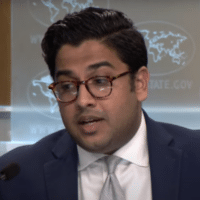-
U.S. ready to play ‘Tibet card’ – Asian Media report
In Asian media this week: Dangerous turn adds new anti-Beijing flashpoint. Plus: Bangkok banks used to supply Myanmar military; Why Hindu nationalists back Israel; Thais opt for neutrality in great-power war; How to stop China slipping into Japan trap; Online gambling an Indonesian epidemic.
-
Biden administration refuses to condemn Israel storming Al-Aqsa mosque, blocks Security Council statement
The Biden State Department refused to condemn Israel’s storming of Al-Aqsa mosque, and blocked a U.N. Security Council statement criticizing the raids.
-
Nothing to learn from East Asia?
Although most East Asian economies have successfully contained the pandemic without nationwide ‘stay in shelter lockdowns’, many governments have seen such measures as necessary. But lockdowns are blunt measures, with inevitable adverse consequences, especially for businesses and employment.
-
Unquiet on the Far Eastern Front
From the FWIW department, a video of an anti-war demonstration of 160 people in Shinjuku, Tokyo, Japan, on 5 December 2010. One of the themes of the Shinjuku demo, as shown in this poster, was (to paraphrase rather than translate): “‘China Will Invade Japan’? Are You Nuts?” In other words, the crazy Japanese right-wingers are […]
-
Turkey’s Political Shift
Part 1 Aijaz Ahmad: Israel, which is completely isolated in the region, is very unhappy about the fact that Turkey is rising as a power which is establishing very productive and extensive contacts in the region. Israel was very happy when both of them were completely isolated in the region: Turkey was in the […]
-
Sanctions and Iran’s Regional and “Eastern” Options
We noticed a small news item, reported from Tehran, which we think deserves more media attention and reflection in the West than it received. According to the story, Chinese Transport Minister Liu Zhijun is expected to visit Iran Sunday to sign a $2 billion contract to build a 360-mile-long railway linking key Iranian destinations that […]
-
Interview with Giovanni Arrighi (Berlin, 2005)
The interview with Giovanni Arrighi below was conducted on 12 November 2005, at the “Kapitalismus Reloaded” international conference held in Berlin. It is published in English here today to commemorate the one-year anniversary of Arrighi’s death. A. Fathollah-Nejad (AFN): Does the West have to fear China? G. Arrighi (GA): I don’t think so. I mean […]
-
Two, Three, Many 1960s
The global Sixties began in Tokyo on June 15, 1960, with the death of Michiko Kanba, an undergraduate at Tokyo University. On the night of her death she had joined a group of fellow university students at the front of a massive demonstration — 100,000 people deep — facing off against the National Diet Building. […]
-
The Other Fateful Triangle: Israel, Iran, and Turkey
The thunderous events set in motion by Israel’s storming of the Mavi Marmara, the lead ship in the peace flotilla challenging the blockade of Gaza, have thrown important light on the overall situation in the Middle East. Turkey has emerged as the major protagonist among the forces that support the Palestinian cause. This is extremely […]
-
Earth Day in Israel: Apartheid Showing through the Greenwash
On April 22, as part of the global Earth Day celebrations, homes, offices, and public buildings in 14 Israeli cities turned out the lights for one hour in an effort to “increase awareness of the vital need to reduce energy consumption.” The Earth Day celebrations included scenes of green fields, wind generators, and rainbows projected […]
-
Militarizing Latin America
The United States was founded as an “infant empire,” in George Washington’s words. The conquest of the national territory was a grand imperial venture, much like the vast expansion of the Grand Duchy of Moscow. From the earliest days, control over the Western Hemisphere was a critical goal. Ambitions expanded during World War II, as […]
-
The Travails of a Client State: An Okinawan Angle on the 50th Anniversary of the US-Japan Security Treaty
“It is incredible how as soon as a people become subject, it promptly falls into such complete forgetfulness of its freedom that it can hardly be roused to the point of regaining it, obeying so easily and so willingly that one is led to say that this people has not so much lost its liberty […]
-
Colored Revolutions in Colored Lenses: A Comparative Analysis of U.S. and Russian Press Coverage of Political Movements in Ukraine, Belarus, and Uzbekistan
This study compared The New York Times‘ and The Moscow Times‘ coverage of the political movements in three former Soviet republics. Data analysis revealed a clear pro-movement pattern in The New York Times’ reporting. The U.S. newspaper used more pro-movement sources than pro-incumbent sources. Overall, The New York Times depicted the protesters favorably and […]
-
In Response to the Bosnia Genocide Lobby
The original title for the article that follows was “Response to ‘Raoul Djukanovic’.” “RD” is the Internet pseudonym of Daniel Simpson, who we mention in our second paragraph (below), and who, as a member of what we refer to as the Bosnia Genocide Lobby, assails us wherever we publish something related to the former Yugoslavia. […]
-
Go East, Young Woman: The Khetagurovite Campaign in the Soviet Borderlands
Elena Shulman. Stalinism on the Frontier of Empire: Women and State Formation in the Soviet Far East. Cambridge: Cambridge University Press, 2008. xiv + 260 pp. $99.00 (cloth), ISBN 978-0-521-89667-2. The frontier as a theme in the development of Russian history has proven a useful means of analyzing the expansion of the state. […]
-
Security Council Condemnation of North Korean “UFO” Deepens Korean Crisis
On 13 April (14 April East Asian time), Claude Heller, the Mexican president of the United Nations Security Council read a “Statement” on behalf of the Council. He condemned North Korea for something described as a “launch” it had conducted on 5 April, demanded it desist from any further such act, reaffirmed the principles of […]
-
Chávez and Ahmadinejad Call for Breaking Free from Free Trade
The presidents of Venezuela and Iran met on Thursday at the presidential palace in Tehran, where they agreed on the need to make a systemic change that allows countries to break free from free trade and promote fair trade and complementary relations between countries. The president of Venezuela, Hugo Chávez, and his Iranian counterpart, Mahmoud […]
-
A Structural Crisis of the System: Interview with István Mészáros
István Mészáros won the 1971 Deutscher Prize for his book Marx’s Theory of Alienation and has written on Marxism ever since. He talks to Judith Orr and Patrick Ward about the current economic crisis. The ruling class are always surprised by new economic crises and talk about them as aberrations. Why do you believe they […]
-
The Unfolding Crisis and the Relevance of Marx
Some of you may have been present at our meeting in this building in May this year, when I recalled what I had said to Lucien Goldman in Paris a few months before the historic French May 1968. In contrast to the then prevailing perspective of “organized capitalism,” which was supposed to have successfully left […]
-
How Globalization Works: Toyota Motor Manufacturing, Texas (TMMTX) — A Case Study
Modern economic class struggle, the unremitting, sometimes hidden, sometimes open, fight between capitalists and workers that erupted in the 19th century and dominated the 20th, is taking on new forms and dimensions in the 21st century. The stakes of this continuing conflict are higher than they have ever been. Every aspect of human life on […]



